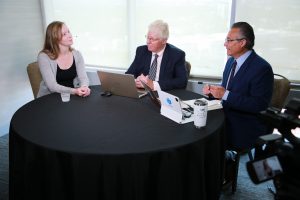 AI
AI
 AI
AI
 AI
AI
Many people find their yearly taxes to be an onerous task but with the aid of artificial intelligence and increased funding, the Internal Revenue Service is looking to improve the IRS user experience for its taxpayers.
The IRS has long valued data science and analytics as an integral part of its operations, according to Melanie Krause (pictured), chief operating officer of the IRS.

Melanie Krause, COO of the IRS, talks about transforming the IRS user experience.
“We are responsible for a lot of information,” she said. “We received, in fiscal year ’23, over 270 million tax returns that we processed. We had more than 60 million taxpayers either call us for help or come into one of our taxpayer assistance centers. The volume of information that we were working with requires use of analytics, key use of data to drive decisions, because with that much work, one can’t be successful without a strong technology, strong analytics focus.”
Krause spoke with theCUBE’s Dave Vellante and Paul Gillin at the CDOIQ Symposium, during an exclusive broadcast on theCUBE, SiliconANGLE Media’s livestreaming studio. They discussed how the IRS organization is evolving and its use of AI.
Krause began her career as a nurse before moving up the government rank. Her experience as an integrator and team member translated from medicine to data analysis.
“The types of skills that make you an effective leader are the same that make you an effective clinician,” she said. “Having a curious mind and then the ability to … lift up the people, all the subject matter experts and demand experts who I work with that, for me, has been the key to success more so than trying to be the expert in all things.”
With AI, Krause has the same open-minded approach, and the IRS has been implementing large language models to inform case selection, support taxpayer services and identify the biggest issues that taxpayers are bringing to the organization. As the IRS further harnesses its data, Krause maintains that security is the number one priority.
“We have been working through opportunities to improve the way that we share data with state and local governments,” she said. “Tax data is really important for establishing whether outreach activities within states and communities to get people into the benefits that they’re entitled to, whether they’re effective. [There’s] that tension between data at your fingertips and zero trust principles that we all struggle with.”
The agency has been overhauling its structure following the $80 billion funding boost it received in 2023, with an emphasis on integrating AI into the IRS user experience and bolstering voluntary compliance services.
“The tax code is very complicated. There are people who are taxpayers who don’t have great mastery of English, and so there’s a lot of barriers to being compliant,” Krause said. “What we’re working on now is working through what the fact base is for the investment in services to help people to get it right the first time. This, too, is really important for the good of government, to focus not just on compliance activities, but on lifting up all of us who are trying to get it right.”
Here’s the complete video interview, part of SiliconANGLE’s and theCUBE Research’s coverage of the CDOIQ Symposium:
Support our mission to keep content open and free by engaging with theCUBE community. Join theCUBE’s Alumni Trust Network, where technology leaders connect, share intelligence and create opportunities.
Founded by tech visionaries John Furrier and Dave Vellante, SiliconANGLE Media has built a dynamic ecosystem of industry-leading digital media brands that reach 15+ million elite tech professionals. Our new proprietary theCUBE AI Video Cloud is breaking ground in audience interaction, leveraging theCUBEai.com neural network to help technology companies make data-driven decisions and stay at the forefront of industry conversations.